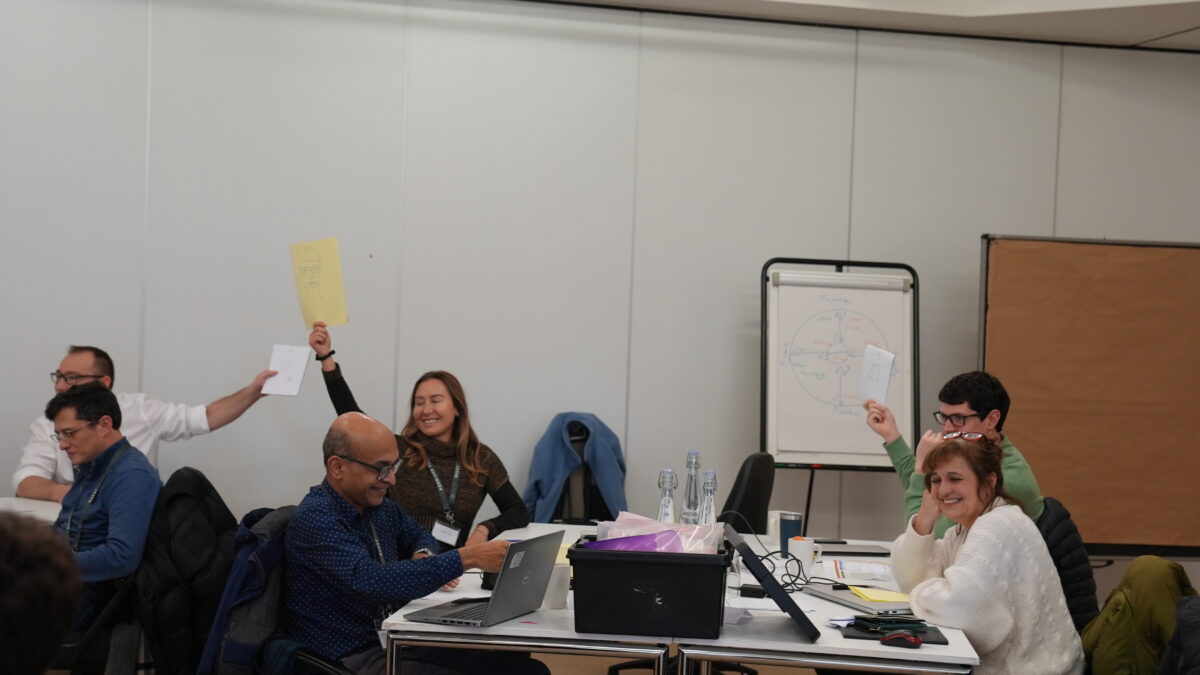Hult Apprentices at Ashridge Cultivate Future Skills, For Life
On day one of National Apprenticeship Week, we’re tapping into today’s ‘Skills for Life’ theme. This theme is also one of our guiding stars at Hult. How do we empower people to build key competencies for a rewarding, long-term career? And how do our apprenticeships specifically equip employers with a future-ready workforce? Transferable skills, often thought of as the ‘human’ skills, are what give us humans the edge over artificial intelligence.
Developing competencies such as communication, problem-solving, teamwork and adaptability are essential for success in any industry or department. And beyond that, at a senior level, cultivating a mindset that can leverage disruption and understand the threats and opportunities that it brings. One that can innovate constantly by approaching problems in new and different ways. By getting creative and leveraging AI in a way that makes it work for us. Human leadership is what sets us apart. And that’s why our apprenticeships incorporate modules such as Innovation, Strategy, Leading Change, and Leading for the Future.
To get a sense of some of these critical topics in action, we popped up on Hult Ashridge campus recently and joined a couple of classes on the Level 7 Senior Leader Apprenticeship. We spoke to Prof. Victoria Harrison-Mirauer in her Design Thinking workshop as part of the Innovation module. Later, we joined Dr. Frederick Holscher’s Future of Work class on the Senior Leader MBA. Here’s what we discovered…
Innovation Class with Victoria Harrison-Mirauer
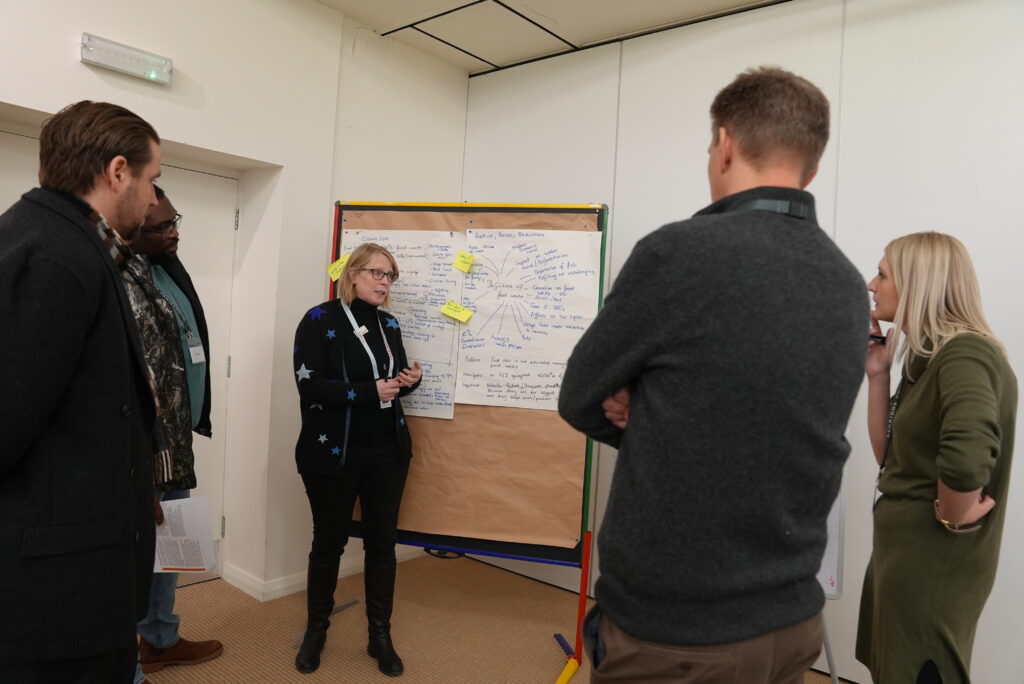

First stop is Prof. Victoria’s Driving Innovation class, where apprentices will be participating in a Design Thinking challenge and prototyping solutions in the afternoon.
Hult: Why do you believe innovation is such an important topic for leaders today?
Prof. VHM: I believe innovation is the single most important topic for leaders today. We’re in a world which is being massively disrupted and upended by developments, particularly in technology. In an environment where the future of work is a hybrid state between human and machine. And where the general perspective from organisations like the World Economic Forum, and others, is that humanity’s future lies in our ability to continue to innovate and be creative. Innovation and creativity go hand in hand. So, I think driving innovation is of critical importance to leaders. Innovation is the source of growth and competitive advantage for organisations. And it’s what keeps life interesting.
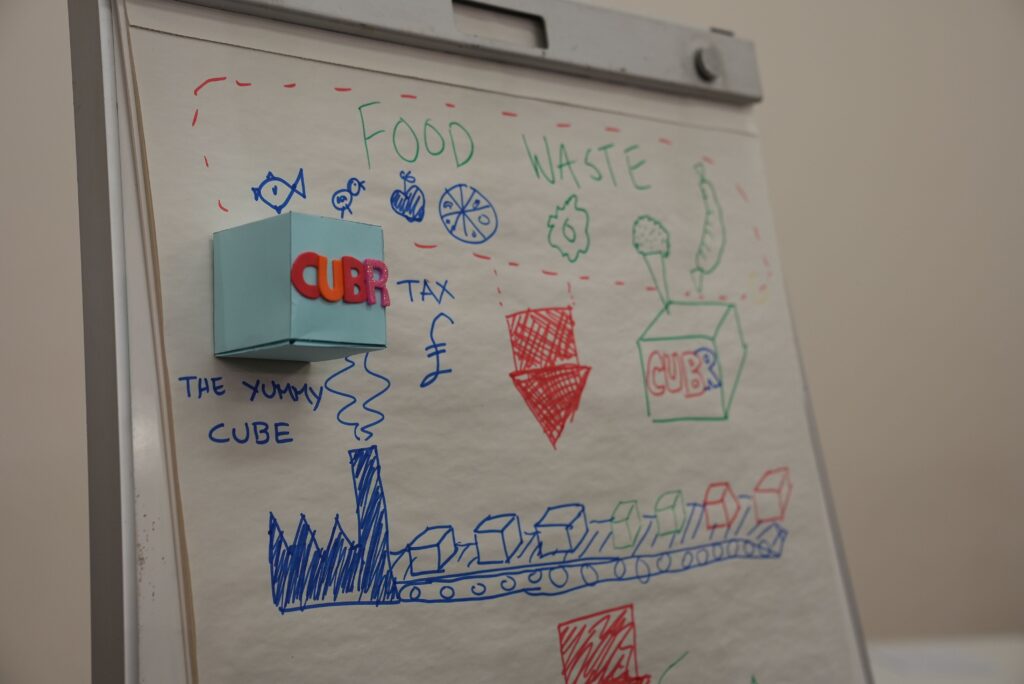

H: How do you share your innovation expertise with your apprentices?
Prof. VHM: I’m very focused on practical application. I’ve got nearly 30 years’ experience in innovation, and so I try to bring that practical knowledge into my lessons. We know people learn by doing. That’s why, at Hult, our whole pedagogy is around experiential learning. And that’s why, today for example, we’re focusing on a Design Thinking exercise. It’s about how can you bring innovation into your own work and practice.
Apprentice View
Sallie Martin, Business Change/Engagement Lead, UK Hydrographic Office
The Innovation module enables us to go a step beyond transformation and think about how we might change the way that we use products to be more focused on customer behaviour. It's about empathising with and identifying unmet customer needs to help us design products that push boundaries and change the way that we operate in the future.
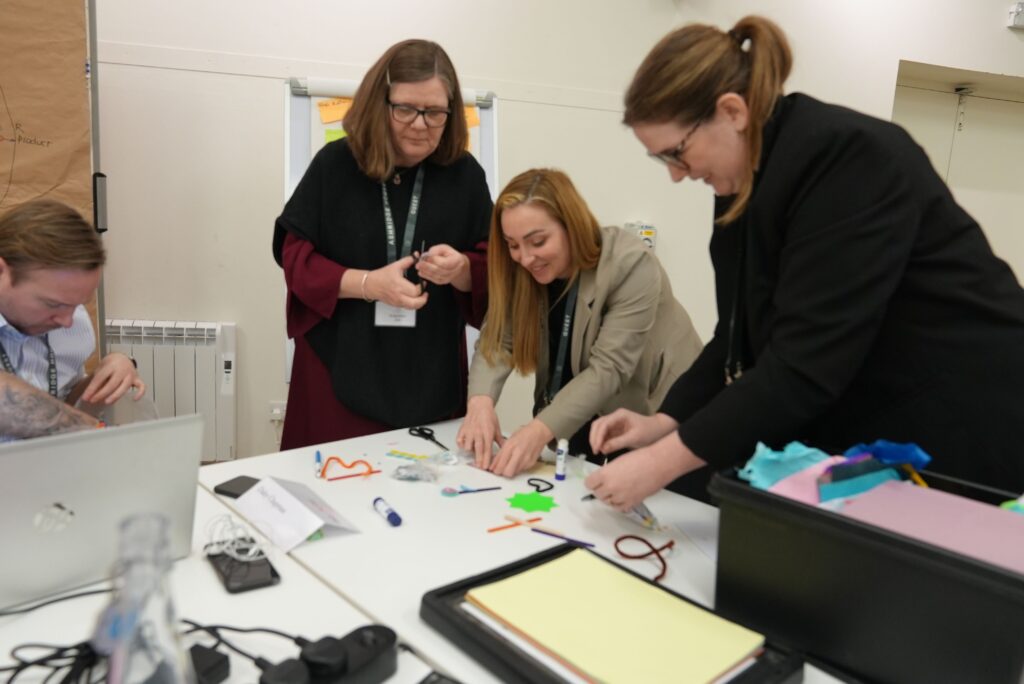

H: How do you ensure that your lessons stay relevant in such a dynamic field?
Prof. VHM: Innovation is a really dynamic field, so we really do try to make sure we bring as much current research and current thinking into the classroom as we possibly can.
Apprentice View
Katie Griffiths, Head of Engagement, Communications & Business Transformation, the Institute of Osteopathy
H: What key takeaways do your students gain from studying innovation with you?
Prof. VHM: My students get a new perspective on what counts as innovation. I think they take away a much broader point of view and understanding of the opportunities to innovate in their own organisations. They learn to be critical, to think differently, to solve problems and think about problem solving in new and different ways. They learn about the context for innovation and, in particular, the digital transformation that’s changing the landscape of work, society and culture. And they learn about the importance of looking beyond their own department, team, organisation and sector to take a little bit of a broader perspective. I hope they recognise the importance of leadership and culture to creating an environment where innovation can thrive. So, they’re able to connect some of the work that they do around change with the work they do around leadership and the work they do around innovation.
Apprentice View
Daley Chapman, Senior Business Development Manager at Briggs & Forrester
And that’s a wrap for this class.
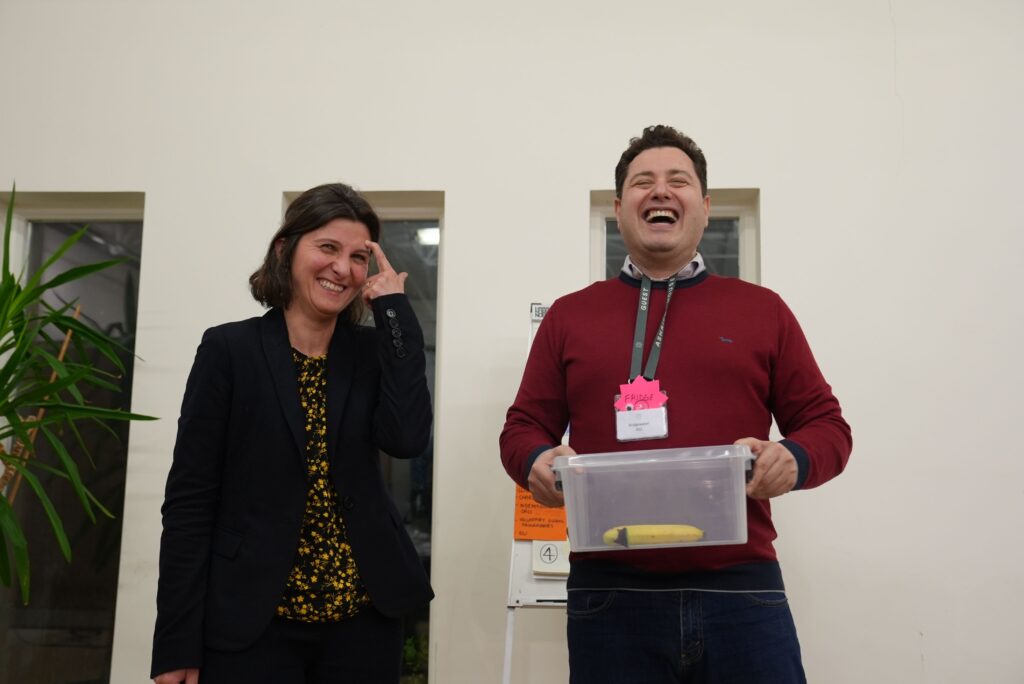

Some great insights for innovation here, thanks to Prof. Victoria and our inspiring apprentices. Just time for a quick walk around the beautiful grounds of Hult Ashridge campus before heading into Dr. Frederick Holscher’s class, where he’s planning to turn the group into a ‘Super Learning Team.’ As a collaborative experience between AI and ‘HI’ (human intelligence), apprentices will develop three skills required for the new world of work: curiosity (asking rich questions), critical thinking, and application of knowledge in the workplace. This is a three-day-immersion, after which, Frederick expects them to be able to take these three skills back into their workplaces and teams and learn how to work together in their own ‘super teams’ to solve the problems they face.
Future of Work class with Dr. Frederick Holscher
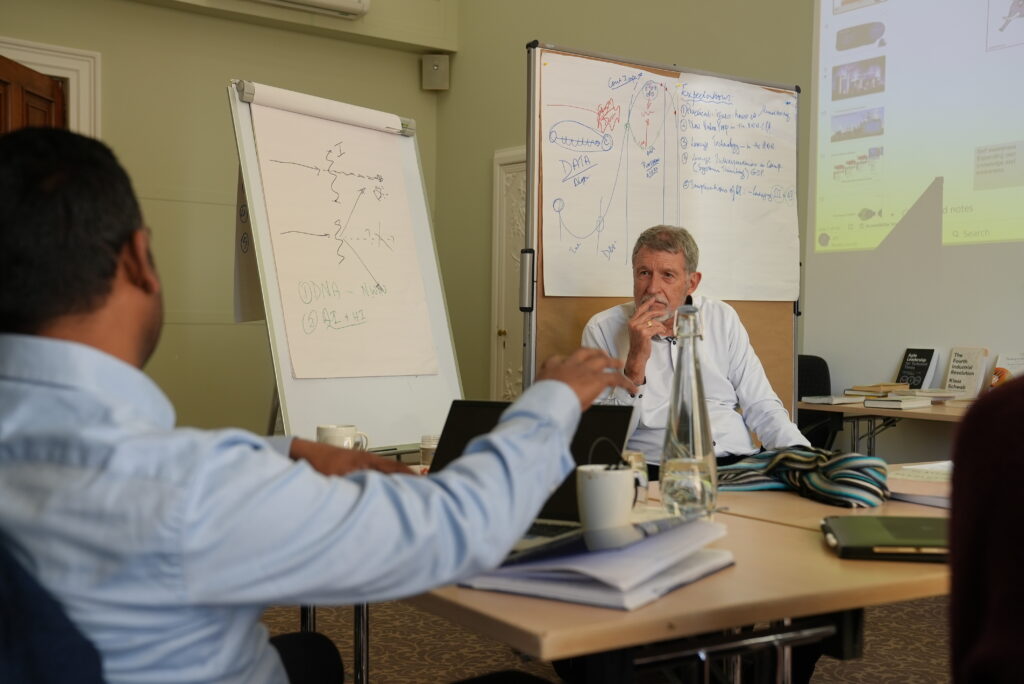

H: How would you describe your teaching style?
Prof. FH: I don’t see myself as a teacher anymore. A teacher teaches somebody. It’s about transfering my skills and my knowledge to them. I create a framework for a discussion, and then I ask questions. I learn as much from them as they learn from me because we’ve created a process of generative dialogue.
Apprentice View
Valerie Elderkin, Head of Midwifery at NHS
Adam Watson, Head of Commercial at Nuffield Health
H: Why do we need to be thinking about the future of work?
Prof. FH: Because it’s surrounding us. We’re in it! We can’t wish it away. We can’t be like an ostrich, put our head in our little department or organisation and say it’s not happening. It touches us on every level. It touches us personally, our society, our politics. Take the wars we’re having around the world. How the technology is playing out compared to the Second World War. It’s a totally different ball game. Like Peter Drucker said: the biggest problem in times of turbulence is not in the turbulence, but in approaching it with yesterday’s logic. We created the problems with yesterday’s logic, but we can’t solve them with yesterday’s logic. So, I’m trying to unearth a new way of thinking about the world. This is what we’re doing in class. We’re sharing new ways of thinking.
H: And how do you create those new ways of thinking?
Prof. FH: Innovation doesn’t necessarily come from all the structural changes that we make in the business or by pumping in technology. The change comes from our mindset and the way we think. And that is what I want to achieve. It’s about how we respond to challenges. And I firmly believe that the answers to the new world of work don’t come from outside. The challenges come from outside, but the answers come from the inside out. And if we can unlock the potential that humans have to think creatively and not give all our power away to artificial intelligence, then we might just have a chance to thrive in the new world of work.
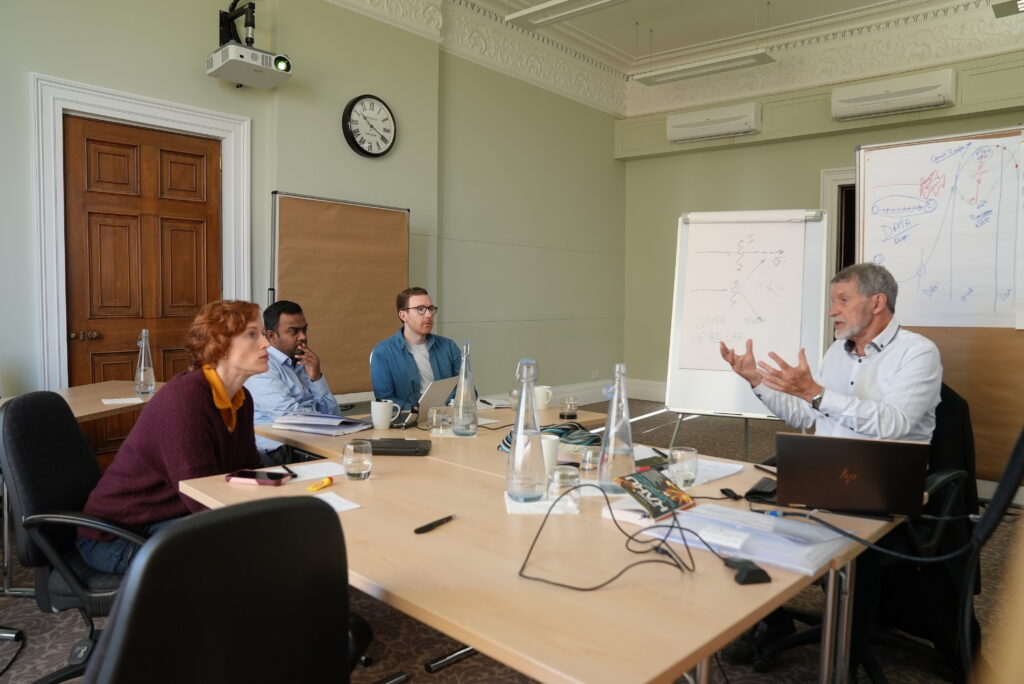
H: What skills can apprentices expect to gain from your class?
Prof. FH: People often think of apprentices as plumbers or electricians. They use tools to fix problems. Our apprentices are managers and leaders in very senior positions. Well, they can use conceptual tools. They use words and frameworks to evoke or to promote a generative dialogue in the workplace.
Apprentice View
Patrick Dawkes, Head of Trading – Hospitals & Primary Care at Nuffield Health
We're learning about frameworks and tools to help shape our thinking but also allowing plenty of time to talk about practical examples and how things might work in our businesses. Frederick has taken lots of time to understand our businesses and our roles within them, so that he can make sure our learning is applicable to our current role but also to broaden it beyond that and on a wider scale fit for the future.
Adam Watson, Head of Commercial at Nuffield Health
Application and use of large language models is something we’ve dived quite deep into. We’ve probably all used these before to some extent but not in the same way that we’ve been applying them on this course. So, rather than just asking a question and taking the answer at face value, it’s how can you be more curious with the questions you’re asking and use the large language model to actually find out what sort of questions you should be asking on a certain subject. And then again what the follow up queries should be.
H: How do your apprentices change their approach as a result of your classes?
Prof. FH: People often say to me that they’ve changed the way they run their meetings. They’re more tuned in. They take an added human factor back to the workplace. They also start to have conversations with other departments about diversity and inclusion, bringing in some new vocabulary to the workplace and rethinking the way that they do strategy.
Apprentice View
Patrick Dawkes, Head of Trading – Hospitals & Primary Care at Nuffield Health
Looking at how things around us are changing in society and the way we're working helps to shift your thinking. It encourages us to approach it in a way that sees what the opportunities are for us as individuals and also for our businesses. For example, in the use of AI and data. Instead of being worried about it, let’s use it creatively to change how we work for the better.
More features from Apprenticeships at Ashridge
The Transformative Power of Level 7 Senior Leader Apprenticeships


